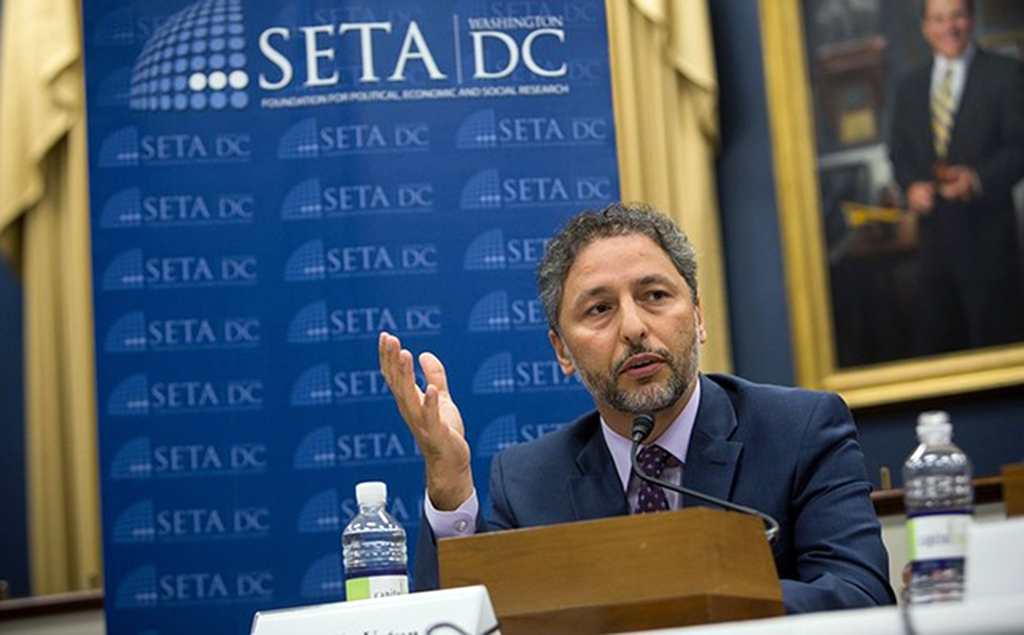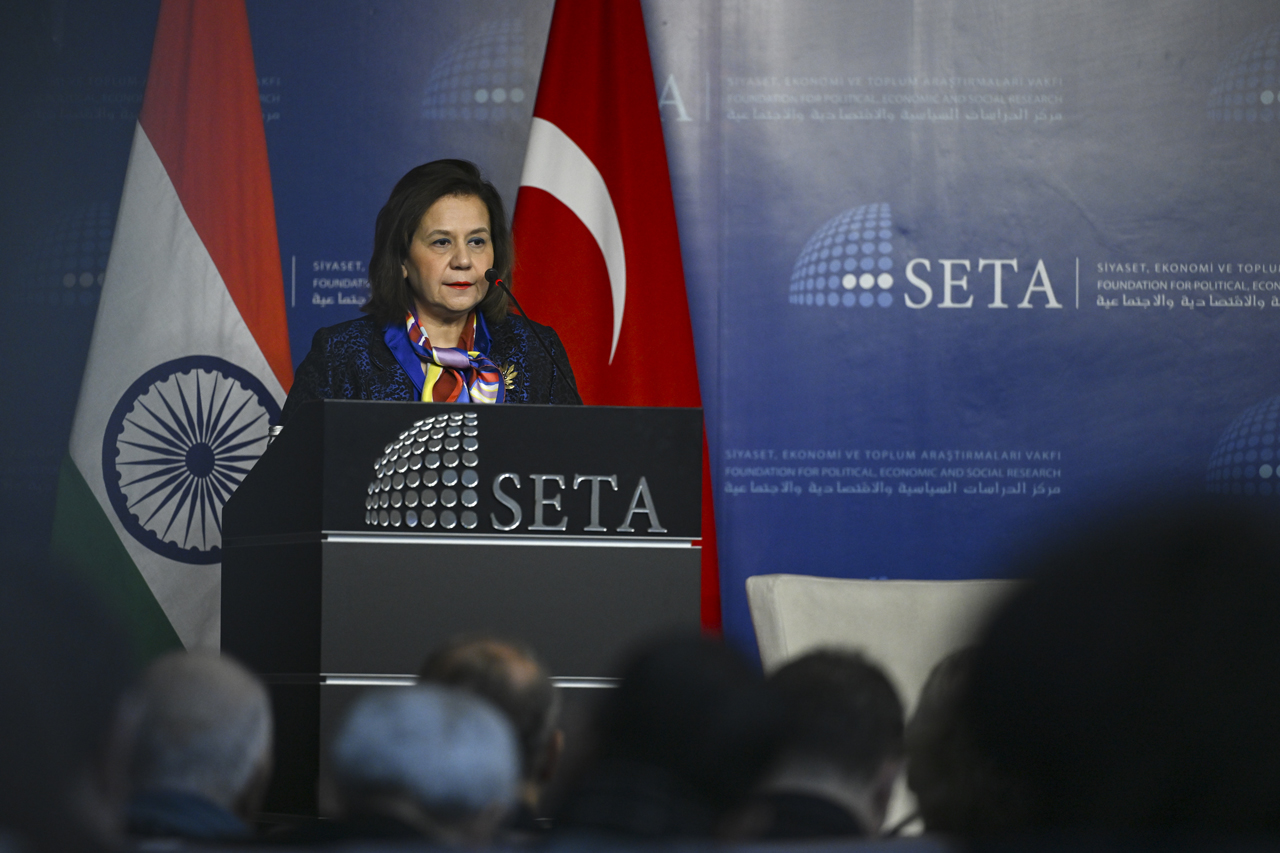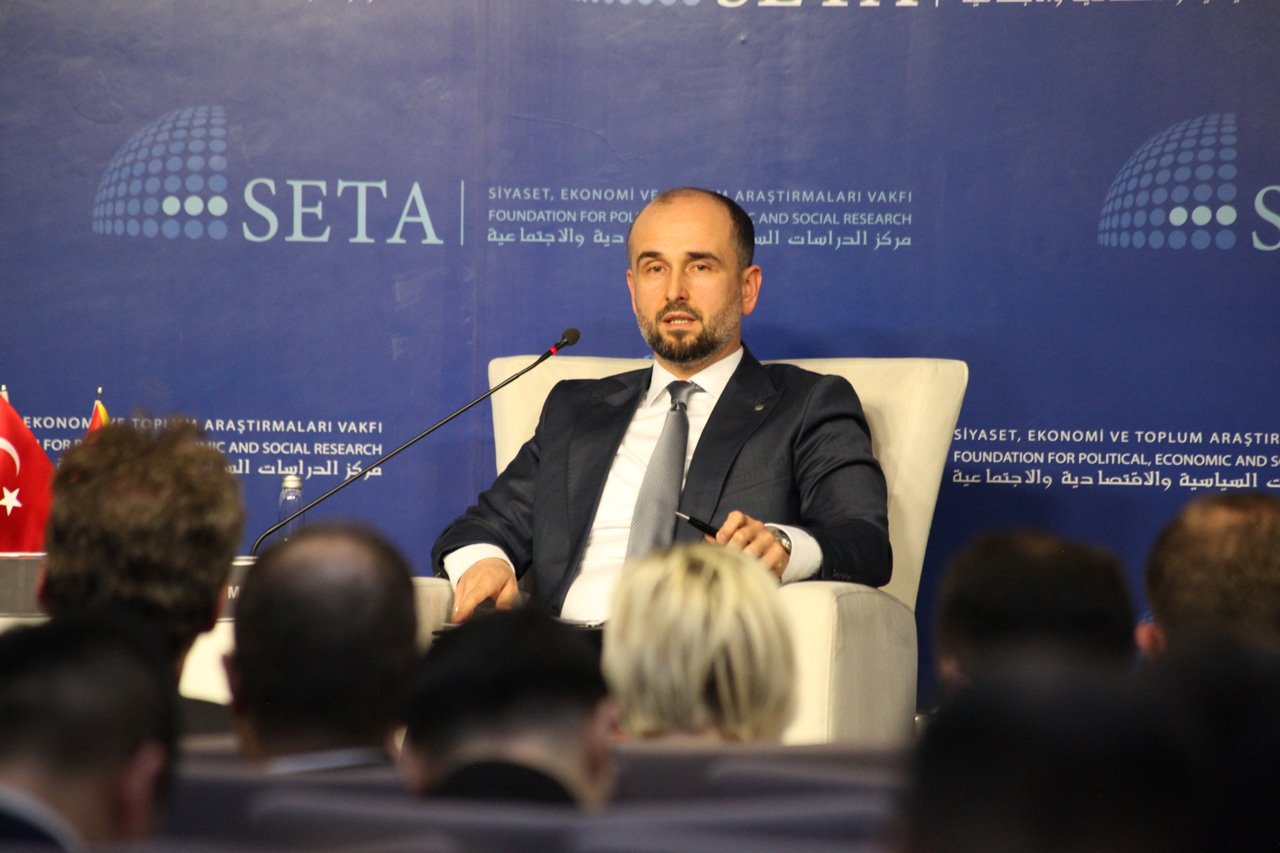
SETA D.C. Director Üstün: Tillerson’s dismissal symptom of political crisis in Washington
As Turkish-U.S relations have been passing through a difficult period, U.S. President Donald Trump announced last week that he fired Secretary of State Rex Tillerson and nominated CIA Director Mike Pompeo via his Twitter account.
Share
As Turkish-U.S relations have been passing through a difficult period, U.S. President Donald Trump announced last week that he fired Secretary of State Rex Tillerson and nominated CIA Director Mike Pompeo via his Twitter account. Answering Daily Sabah's questions about Tillerson's dismissal and the future of bilateral relations Dr. Kadir Üstün, executive director of Washington D.C-based independent think tank the Foundation for Political, Economic and Social Research (SETA) in Washington, D.C. said after Tillerson's dismissal many administration officials will find it increasingly difficult to craft and implement policy as uncertainty reigns in terms of leadership, personnel and sense of direction. More importantly Dr. Üstün believes that this episode is a symptom of a political crisis in Washington D.C and therefore U.S. foreign policy will continue to be unpredictable.
President Trump mentioned during Tillerson's firing that their differences over Iran was one of the main reasons for this change. Thus, Dr. Üstün predicts that under the new secretary of state, Mike Pompeo, the US will try to be more aggressive against Iran by containing it and perhaps putting more pressure on some pro-Iranian militias or assets in Iraq, Syria and elsewhere.
Regarding the future of U.S.-Turkish relations, Dr. Üstün said the dynamics in northern Syria that continue to threaten Turkish national security are a major factor poisoning the relationship, and he underlined that this was not a problem between personalities but a strategic divergence that came to the brink of a strategic conflict on the ground. Dr. Üstün believes the strategic dialogue mechanism that started with Tillerson's most recent visit to Turkey would continue and there is no reason for Pompeo to cancel the newly-established mechanism while adding that there are strong signs that some progress has already been made in the first meeting of the Turkish delegation in Washington. According to him, the U.S. needs to work with Turkey to ensure stability in northern Syria through creating genuinely local and inclusive administrations that are not under the PKK and the People's Protection Units (YPG) control and this is the best way to solve problem between Turkey and the U.S.
Daily Sabah: First of all, how do you evaluate the dismissal of U.S. Secretary of State Rex Tillerson through U.S. President Donald Trump's tweet and also that of Steve Goldstein, the undersecretary of the State Department, hours after his boss?
Kadir Üstün: It was known all along that Tillerson's departure was just a matter of time but the manner of his firing via President Trump's Twitter message was a first in American politics. Trump has attacked his own cabinet members on Twitter many times and undermined his own secretary of state's negotiation efforts in the North Korea issue but the dismissal of Tillerson will have a chilling effect on those who work in this administration. Many administration officials will find it increasingly difficult to craft and implement policy as uncertainty reigns in terms of leadership, personnel and sense of direction.
Perhaps more importantly, this episode is a symptom of a political crisis in Washington. A management crisis that renders impossible devising cohesive and effective policies on a number of national security and foreign policy issues. The president's own style of running a government is one that fosters and is proud of "chaos." For Trump, it is the conflict and competition of different cabinet members that would bring success. This could be true in an environment where there is a strong sense of direction and leaders fight to shape the process. In the Trump administration, however, it seems that the virtual "fight" itself is a virtue and there is no guidance to harness the positive energy out of the struggle. This makes it destructive instead of constructive. It will probably mean more uncertainty and less comprehensive policies being formed in Washington. In that case, U.S. foreign policy will continue to be unpredictable.
DS: As you know former CIA Director Mike Pompeo has been appointed as the new U.S. secretary of state and Gina Haspel as the new CIA Director. Some experts expect a more confrontational foreign policy with these appointments. What is your thought about it?
KÜ: This might very well be the case but let us not forget that the election of Trump was partly because of his noninterventionist rhetoric. Trump had very harsh words for former President George W. Bush about the Iraq war and he won the primaries against Jeb Bush in South Carolina by a strong margin. The American public is opposed to a major military commitment overseas and that's why they elected Trump. There is always the danger of miscalculations, but as we saw in the North Korea's case, Trump is not interested in military intervention despite his strong rhetoric. He was rather quick to tone it down and accepted to meet with Kim Jong Un. Trump would like to score some big points in foreign policy by looking like he stuck to his campaign promises.
It is well known that Pompeo has a good rapport with the president and he is hawkish, especially on Iran. President Trump promised to rip up the Iran deal but he has been unable to do so by now. He mentioned during Tillerson's firing that their differences over Iran was one of the main reasons for this change. So, we might see Pompeo pushing much harder first for the renegotiation of the nuclear deal (which is unlikely to happen), and then for the U.S. to pull out of the agreement altogether. At that point, the Trump administration would probably try to increase pressure on Iran but it would be close to impossible to build the same kind of international isolation of Iran as North Korea. I think no matter how confrontational the Trump administration might become under Pompeo's leadership at the State Department, it will continue to avoid large-scale military interventions. At the same time, we will probably see more aggressive efforts to confront Iran in the region, in a way that satisfies the current Israeli leadership rather than provide a stabilizing effect in the region.
DS: Relations between the U.S and Turkey started to improve recently after Tillerson's recent visit to Turkey. Moreover Turkish Foreign Minister Mevlüt Çavuşoğlu was scheduled to visit D.C. on March 19 but the trip is postponed for now. Do you reckon that Çavuşoğlu and Pompeo can make a fresh start and pick up where Tillerson left off in this regard?
KÜ: The U.S.-Turkey relationship is going through a difficult time and the dynamics in northern Syria that continue to threaten Turkish national security are a major factor poisoning the relationship. This was the case under the Obama administration and continues under the Trump administration as well. So, this was not a problem between personalities but a strategic divergence that came to the brink of a strategic conflict on the ground. The central challenge for the U.S.-Turkey relationship today will be to address Turkey's national security concerns in northern Syria. The U.S. can achieve true stability only by working with Turkey and recognition of this has already started at the top echelons of the Trump administration.
I'd assume that the strategic dialogue mechanism that started with Tillerson's most recent visit to Turkey would continue and there is no reason for Pompeo to cancel the newly-established mechanism. There are strong signs that some progress has already been made in the first meeting of the Turkish delegation in Washington. It will be crucially important for this mechanism to continue and achieve concrete results. If successful and satisfactory, it can serve as a catalyst for a healthier U.S.-Turkey relationship. The priority should be to rebuild trust that has been damaged because of the U.S. support for the People's Protection Units (YPG). If the two sides can reach a common understanding, the strategic dialogue can potentially be expanded over other regional issues as well. For instance, it will be very important for the U.S. and Turkey to understand each other's positions vis-à-vis Iran, especially since all signs are that the Trump administration will favor a more aggressive approach in the near term.
DS: Just a day before Tillerson's dismissal Çavuşoğlu said Turkey and the U.S. have agreed to jointly monitor the security in Manbij and other areas east of the Euphrates River once the YPG withdraws from the region. But now there is now a question mark regarding the future of that process. What would be your comment on it?
KÜ: If this agreement is implemented, it would be a very positive trust-building measure that I just mentioned. Turkey's perspective on the YPG is very clear. It is the Syrian branch of the PKK and it is trying to create an autonomous zone under PKK control that threatens Turkey. The relationship between the PKK and the YPG is actually acknowledged by the most senior American officials including the intelligence community's assessments. The U.S. government made an artificial distinction between the two to be able to use the YPG as its "ground forces" against ISIS [Daesh].
Now that ISIS no longer holds territory, it is time for the U.S. to take a look at the wisdom of supporting the YPG. The YPG was not successful without U.S. air support and it is a destabilizing factor as it strikes deals with a variety of actors including the Assad regime. It is not committed to the U.S.'s declared goals but to the PKK's political and strategic goals. If the U.S. reconsiders and the YPG forces move to the east of the Euphrates, this would satisfy one of the central Turkish demands. The U.S.-Turkey joint patrols in Manbij could be a trust building measure as well. The question then will be whether the two NATO allies can expand this kind of cooperation and build a common policy on the ground.
The YPG moving to the east of the Euphrates would satisfy a core demand but Turkey will likely continue to raise questions about the U.S. support to the group, which gives it not just arms and ammunition but political legitimacy and leverage against Turkey. This will be a continuous irritant in the relationship and it would continue to destabilize the U.S.-Turkey ties. The U.S. needs to work with Turkey to ensure stability in northern Syria through creating genuinely local and inclusive administrations that are not under PKK/YPG control.
DS: The reason for Tillerson's exit was reported as differences of opinion between him and Trump on the issue of Iran. Do you think that the U.S. policy toward Iran and Iranian expansionism in the Middle East will be harsher? What kind of steps can we expect from Washington in the region?
KÜ: President Trump seems particularly irritated by the fact that the U.S. continues to be part of the Iran nuclear deal. This was Obama's arguably biggest foreign policy success and Trump cannot wait to reverse it. Trump was particularly angry about being "forced" to certify that Iran continued to comply with the deal. He held Tillerson responsible for not providing enough options outside certifying the deal. Trump seems dead set on pulling the U.S. out of the deal and he could not do it partly as a result of Tillerson's (among others) resistance. Pompeo is known to be more hawkish on Iran and he will be much more likely to do what Trump wants, if not more.
The short answer is yes, the U.S. will try to be more aggressive against Iran by containing it and perhaps putting more pressure on some pro-Iranian militias or assets in Iraq, Syria, and elsewhere. Secretary of Defense James Mattis is not necessarily a dove on Iran either so there is a strong change that the U.S. policy toward Iran will tilt toward more pressure, sanctions and probably covert action as well. But Pompeo and Mattis may find themselves at odds if the confrontation looks like it is getting out of hand and heading toward a major military escalation.
Some of the potential steps could be the following: The U.S. might insist on the Baghdadi government to distance itself from Tehran, contain and put pressure on Hezbollah's activities in Syria, increase support to Saudi Arabia and the United Arab Emirates [UAE] against Iran, and deepen the alignment of its policies with Israel. All these measures could be considered pushing back against Iran and there would be many supporters of this policy in the administration. Nevertheless, Russia may seek to exploit the new alignments in such a way that in some instances, the U.S. effort to put pressure on Iran might actually prove ineffective. Turkey could find itself in a situation where it would be in support of policies preventing further Iranian reach into the region but it would oppose steps that would destabilize the region and lead to a potential military confrontation between the U.S. and Iran.
DS: A tweet Pompeo sent shortly after the July 15 coup attempt in Turkey, which called both Turkey and Iran "totalitarian Islamic dictatorship," has been brought to the agenda after his appointment as the new secretary of state. Do you think Pompeo's stance toward Turkey will especially have a negative impact in this regard?
KÜ: There have been a lot of misconceptions and misunderstandings in the West of the failed coup attempt in Turkey. This was yet another such instance but I don't think it will have a significant impact on U.S.-Turkey relations. One of the main issues in the bilateral relationship has been the fact that the failed coup attempt has shaken the Turkish security establishment to its core but U.S. policymakers haven't shown the kind of solidarity and support a NATO ally would have needed. The impact of the failed coup attempt is still continuing in Turkey and the extradition of [Fetullah] Gülen and Gülenist Terror Group (FETÖ) members will be important in U.S.-Turkey relations.
At the same time, it is important to note that some Islamophobic circles have supported the current administration and some of the policies of the Trump administration (the travel ban, Jerusalem decision) have been seen as anti-Islam or anti-Muslim. U.S. foreign policymaking is a complex process prioritizing national interests but cultural perceptions can have an impact on the policy processes as well. If administration officials employ such anti-Islam rhetoric, their policies would be seen in that light as well and it would add an extra layer of difficulty to the U.S. relations with the Muslim world and Turkey.
[Daily Sabah, 19 March 2018]
Tags »
Related Articles








